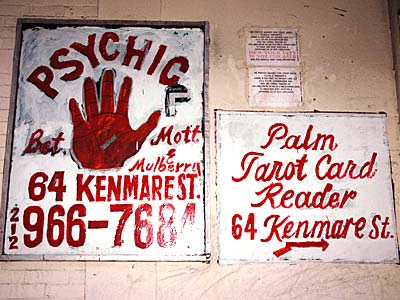The psychic has a long-standing place in the urban division of labour, particularly as a form of women’s informal labour—which reaches back to the mid-nineteenth century and the rise of spiritualism, as well as to the history of Roma immigration to American cities. Her past, however, is often obscured by the myriad forms the psychic takes throughout the informal economies of the city, ranging from storefront psychic to executive “psychic” life coach. In this regard, psychic shops are only one type of psychic space in the city, or one node in a network of “psychic” spaces, each producing differently sanctioned forms of talk and intimacy. Yet, within this network of spaces the storefront psychic remains suspect. She is the purveyor of “illegitimate” conversations. Nonetheless, her store and her ubiquitous signage co-author the visual text of the city and inform the texture and feel of life in this environment.
Read More | "Geography of Intimacy" | Karen Gregory | ?The State
